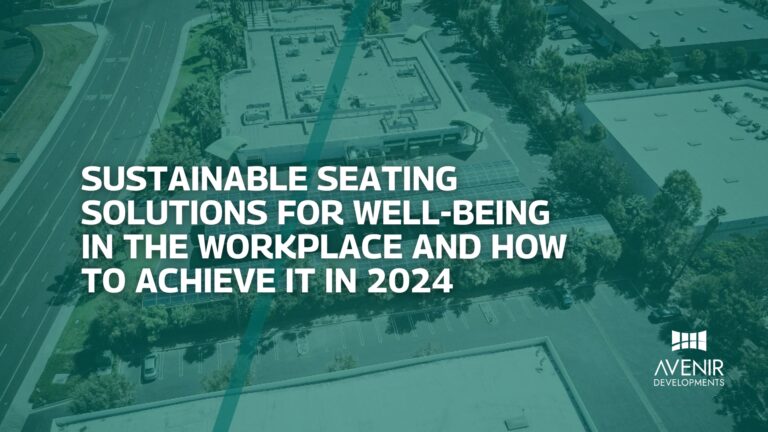In the modern workplace, where we spend a significant portion of our lives, well-being is of paramount importance. Sustainable seating solutions are at the forefront of creating a healthier and more eco-conscious work environment. This article delves into the world of sustainable seating solutions, exploring their benefits, features, and how they contribute to overall well-being in the workplace.
As an architect and interior designer with over two decades of experience, I’ve seen firsthand how the design of our spaces can significantly impact our well-being. One often-overlooked aspect is the furniture we choose. In today’s environmentally conscious world, it’s crucial to consider not only aesthetics and comfort but also sustainability. In this blog post, we’ll delve into the world of sustainable seating solutions and explore how they can contribute to a healthier, more eco-friendly workplace.
We’ll discuss the latest trends, benefits, and considerations when selecting sustainable seating options. By the end of this post, you’ll be equipped with the knowledge to make informed decisions that align with your business goals and environmental values.

A Seat at the Table of Sustainability
The concept of sustainable seating may seem novel, but it’s rooted in a long history of human ingenuity and environmental awareness. For centuries, people have sought to create comfortable and functional seating solutions using natural materials and sustainable practices. From the ergonomic chairs of ancient Egypt to the minimalist designs of Scandinavian mid-century modern, furniture has evolved to meet the needs of changing times.
In recent years, the growing concern for environmental sustainability has led to a renewed focus on creating seating solutions that minimize their impact on the planet. This shift has been driven by factors such as climate change, resource depletion, and increasing awareness of the link between human health and environmental health.
Why Sustainable Seating Matters
Sustainable seating is more than just a trend; it’s a conscious choice that can benefit both individuals and the planet. Here are some key reasons why sustainable seating matters:
- Reduced Environmental Impact: Sustainable seating solutions are often made from eco-friendly materials, such as recycled plastic, reclaimed wood, and organic fabrics. These materials require fewer resources to produce and have a lower carbon footprint.
- Improved Indoor Air Quality: Many traditional furniture materials, such as particleboard and certain types of foam, can release harmful volatile organic compounds (VOCs) into the air. Sustainable seating options, on the other hand, are often made from materials with low or no VOC emissions, contributing to better indoor air quality.
- Enhanced Well-being: Ergonomic seating is essential for maintaining good posture, preventing musculoskeletal disorders, and reducing fatigue. Sustainable seating solutions often prioritize ergonomic design, ensuring that users can sit comfortably and productively for extended periods.
- Durability and Longevity: Well-designed, sustainably sourced furniture is built to last. By investing in high-quality, durable seating, you can reduce the need for frequent replacements and minimize waste.
By incorporating sustainable seating into your workspace, you can create a more environmentally responsible and employee-friendly environment.

Sustainable Seating Solutions for Well-Being in the Workplace
Sustainable seating solutions not only cater to the comfort of employees but also address the environmental concerns of today. Here, we will discuss various aspects of these solutions, from ergonomic designs to eco-friendly materials.
Ergonomics: A Key to Comfort and Health
Ergonomics is the science of designing workplace equipment and environments for maximum comfort and efficiency. Sustainable seating solutions prioritize ergonomics to provide employees with comfortable, supportive chairs that reduce the risk of musculoskeletal problems.
Eco-Friendly Materials
The use of eco-friendly materials in sustainable seating solutions is a win-win. It not only promotes a healthier environment but also ensures that the products are free from harmful chemicals. Chairs made from recycled or sustainable materials are gaining popularity for their durability and environmental benefits.
Design for Productivity
Well-being at the workplace goes hand in hand with productivity. Sustainable seating solutions are designed with productivity in mind. They offer features such as adjustable heights, lumbar support, and breathable fabrics, all contributing to enhanced focus and efficiency.
Cost-Efficiency
Investing in sustainable seating solutions is a smart financial move for any organization. While the initial cost might be higher, the long-term benefits include reduced absenteeism due to health issues and increased employee satisfaction.
Versatility and Adaptability
Modern workplaces often require versatile seating options. Sustainable seating solutions come in various styles to suit different office setups. From standing desks to collaborative spaces, these chairs can adapt to various work environments.
Noise Reduction
A quieter workplace can significantly improve well-being. Some sustainable seating solutions come with noise-reduction features, making it easier for employees to concentrate in open office settings.

Emerging Trends in Sustainable Seating
The landscape of sustainable seating is constantly evolving, with innovative designs and materials emerging to meet the needs of modern workplaces. Let’s explore some of the latest trends shaping the industry:
Biophilic Design and Natural Materials
Biophilic design, which integrates elements of nature into built environments, is a growing trend in interior design. Sustainable seating solutions often incorporate natural materials like wood, bamboo, and wool, which can improve air quality and create a more calming atmosphere.
Modular and Customizable Seating
Modular seating systems offer flexibility and adaptability, allowing you to create custom configurations to suit your specific needs. These systems often prioritize sustainability by using modular components that can be easily disassembled, repaired, and reused.
Smart Seating Solutions
Technology is also playing a significant role in the evolution of sustainable seating. Smart seating solutions, equipped with sensors and software, can adjust to the user’s posture, weight, and preferred sitting position. These intelligent chairs can promote better ergonomics and reduce the risk of musculoskeletal disorders.
Recycled and Upcycled Materials
Many manufacturers are turning to recycled and upcycled materials to create sustainable seating options. Recycled plastic, reclaimed wood, and repurposed textiles are just a few examples of materials that can be used to create stylish and eco-friendly furniture.
Local Sourcing and Fair Trade
Supporting local businesses and fair trade practices is another important aspect of sustainable seating. By sourcing materials and manufacturing products locally, you can reduce carbon emissions associated with transportation and support your community.
Government and Industry Initiatives
Governments around the world are increasingly recognizing the importance of sustainable practices in the furniture industry. Many countries have implemented regulations to promote eco-friendly manufacturing and encourage the use of sustainable materials. Additionally, industry organizations and certification bodies are working to establish standards for sustainable furniture, ensuring that products meet specific environmental and social criteria.
To drive the adoption of sustainable seating solutions, we must continue to raise awareness, educate consumers, and support innovative businesses. As individuals, we can make a difference by choosing sustainable products and advocating for environmentally responsible practices. By working together, we can create a more sustainable future, one seat at a time.
Frequently Asked Questions
Q: Are sustainable seating solutions expensive?
A: While the initial cost might be higher, they are cost-efficient in the long run due to improved employee health and productivity.
Q: Are these chairs suitable for remote work?
A: Yes, many sustainable chairs are versatile and can be used in home offices as well.
Q: Do sustainable chairs have a warranty?
A: Yes, most reputable brands offer warranties on their products.
Q: How can I ensure the eco-friendliness of a chair?
A: Look for chairs made from recycled or sustainably sourced materials and check for relevant certifications.
Q: Can sustainable chairs be customized for different body types?
A: Yes, many of them offer adjustable features to accommodate various body types.
Q: Are sustainable chairs easy to clean?
A: Yes, most are designed for easy maintenance with removable and washable covers.
Q1: What are the main benefits of sustainable seating?
A: Sustainable seating offers a multitude of benefits, including reduced environmental impact, improved indoor air quality, enhanced well-being, and increased durability. By choosing eco-friendly materials and prioritizing ergonomic design, you can create a healthier and more sustainable workspace.
Q2: How can I identify sustainable seating options?
A: When selecting sustainable seating, look for products that are certified by reputable organizations such as the Forest Stewardship Council (FSC) or the Global Organic Textile Standard (GOTS). Additionally, consider the materials used, the manufacturing process, and the company’s commitment to sustainability.
Q3: Are sustainable seating options more expensive than traditional furniture?
A: While some sustainable seating options may have a higher initial cost, they often offer long-term savings due to their durability and longevity. Additionally, investing in sustainable furniture can contribute to a healthier and more productive workplace, leading to increased employee satisfaction and reduced absenteeism.
Q4: How can I maintain the sustainability of my seating choices?
A: To maintain the sustainability of your seating choices, consider the following tips:
Proper Care and Maintenance: Regular cleaning and maintenance can extend the lifespan of your furniture.
Responsible Disposal: When it’s time to replace your furniture, choose responsible disposal methods, such as recycling or donating.
Future-Proofing Your Space: As sustainability standards evolve, consider future-proofing your workspace by selecting modular and adaptable seating solutions that can be easily updated or repurposed.
By following these guidelines, you can ensure that your seating choices remain sustainable throughout their lifecycle.
Expert Tips for Selecting Sustainable Seating
As an experienced architect and interior designer, I’ve had the opportunity to work with a wide range of sustainable seating solutions. Here are some expert tips to help you make informed decisions when selecting sustainable seating for your space:
- Prioritize Ergonomics:
- Choose chairs that support good posture: Look for chairs with adjustable seat height, lumbar support, and armrests.
- Consider the task: Different tasks require different types of seating. For example, a task chair is ideal for desk work, while a lounge chair is more suitable for relaxation.
- Test before you buy: Take the time to sit in different chairs to find the one that provides the best comfort and support.
- Opt for Sustainable Materials:
- Look for certifications: FSC-certified wood, recycled plastic, and organic fabrics are all excellent choices.
- Consider the lifecycle: Evaluate the entire lifecycle of a product, from sourcing materials to end-of-life disposal.
- Support local businesses and fair trade practices: This can help reduce your carbon footprint and support ethical manufacturing.
- Invest in Durability and Longevity:
- Choose high-quality construction: Well-made furniture will last longer and require fewer replacements.
- Consider repairability: Look for furniture that can be easily repaired or reupholstered.
- Plan for future needs: Consider how your seating needs may change over time and choose furniture that can adapt to evolving requirements.
- Create a Harmonious Workspace:
- Combine form and function: Choose seating that complements your overall design aesthetic.
- Consider the acoustics of your space: Sound-absorbing materials can help reduce noise pollution and create a more peaceful environment.
- Prioritize natural light and ventilation: Good lighting and airflow can improve productivity and well-being.
By following these tips, you can create a sustainable and stylish workspace that promotes productivity and well-being. Remember, sustainable seating is not just about the environment; it’s about creating spaces that inspire and uplift.
Sustainable seating solutions are a crucial aspect of fostering well-being in the workplace. Their ergonomic designs, eco-friendly materials, and versatile features make them a valuable addition to any office. Investing in these chairs not only benefits employees’ health but also contributes to a greener planet.
In a world where the lines between work and personal life are increasingly blurred, providing employees with sustainable seating solutions is a step towards creating a more comfortable and productive work environment.
By incorporating sustainable seating solutions into your workspace, you can create a healthier, more eco-friendly, and productive environment. By prioritizing ergonomics, choosing sustainable materials, and investing in durable, high-quality furniture, you can make a positive impact on both your business and the planet.
Remember, sustainable seating is not just a trend; it’s a commitment to a better future. By making informed decisions and supporting sustainable practices, we can create a world where comfort, style, and sustainability coexist.
Ready to elevate your workspace? Contact Avenir Developments today to discuss your sustainable seating needs. Our team of experts can help you select the perfect furniture to enhance your space and promote well-being. Call us at +923001101103 or reach out via WhatsApp for a consultation.
Read More: Modern House Design in Lahore: Top Trends to Watch in 2024






